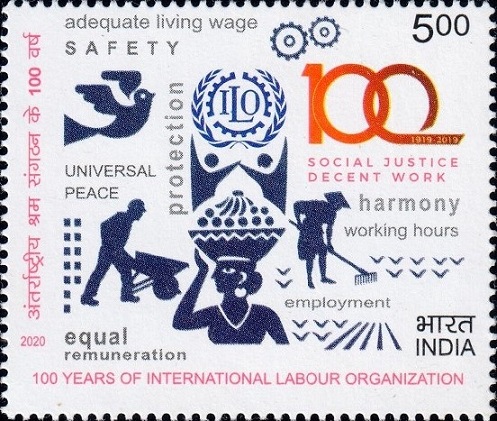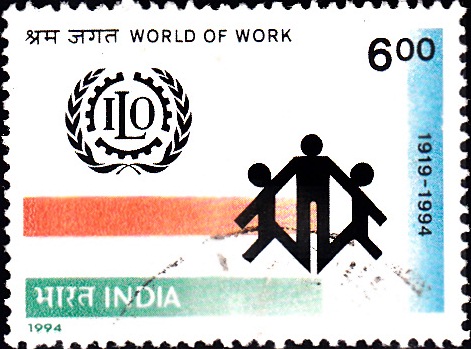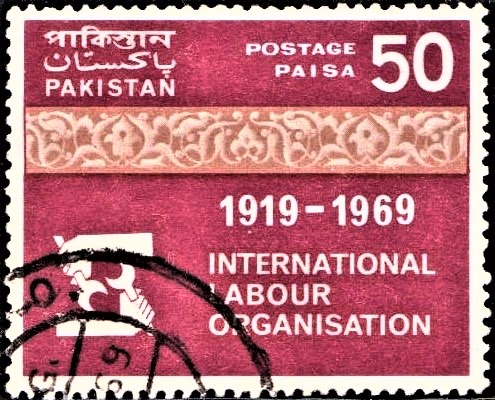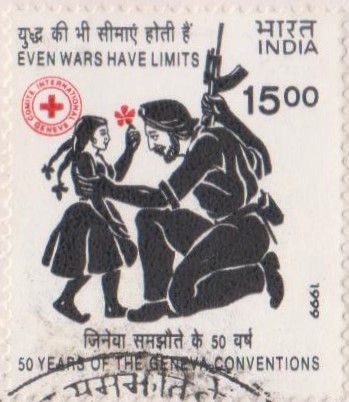
India on International Labour Organization 2020
A commemorative postage stamp on the 100 Years of International Labour Organisation (ILO), a United Nations agency :
 Issued by India
Issued by India
Issued on Jan 22, 2020
Issued for : Department of Posts is pleased to issue a Commemorative Postage Stamp on the International Labour Organization to mark 100 years of its foundation.
Credits :
Stamp/FDC/Brochure : Shri Sankha Samanta
Cancellation Cachet : Smt. Alka Sharma
Type : Stamp, Mint Condition
Colour : Multi Colour
Denomination : 500 Paise
Stamps Printed : 600000
Printing Process : Wet Offset
Printer : Security Printing Press, Hyderabad
About :
- The International Labour Organization (ILO) came into existence in 1919. Over the course of 100 years, the ILO has witnessed significant developments and scaled new heights in their mandate to promote welfare of the workers. The ILO is the only tripartite United Nations Agency that brings together Governments, employers and workers of 187 Member States to set labour standards, develop policies and devise programmes to promote decent work for all women and men and to provide social protection to workers. India is a founder member of the ILO and has a rich legacy of upholding the ILO’s objectives and spirit. India’s well-established Tripartite mechanisms that are at the heart of the ILO’s consultative process (where adequate representation is given to Workers’ / Employers’ and the Government) have resulted in a robust and dynamic system of deliberative process for labour policy formulation.
- The main aims of the ILO are to promote rights at work, encourage decent employment opportunities, enhance social protection and strengthen dialogue on work-related issues. The ILO achieves its mandate by way of setting up of international labour standards in the form of Conventions and Recommendations. Conventions are international treaties and instruments, which are legally binding obligations on the countries that have ratified them. Therefore, every ratified convention is embedded in the constitutional principles of a country or backed by a supporting legal or policy framework. Recommendations are non-binding and set out guidelines orienting national policies and actions.
- The three organs of the ILO are:
- International Labour Conference: – General Assembly of the ILO – Meets every year in the month of June.
- Government Body: – Executive Council of the ILO. Meets three times in a year in the months of March, June and November.
- International Labour Office: – A permanent secretariat.
- Except for the interruption caused by the Second World War, the International Labour Conference has continued, since its first session in 1919 to meet at least once a year. The Conference, assisted by the Governing Body, adopts biennial programme and budget, adopts International Labour Standards in the form of Conventions and Recommendations and provides a forum for discussing social, economic and labour related issues. India has regularly and actively participated in the Conference through its tripartite delegations. The Conference has so far had 4 Indian Presidents viz. Sir Atul Chatterjee (1927), Shri Jagjivan Ram, Minister for Labour (1950), Dr. Nagendra Singh, President, International Court of Justice (1970) and Shri Ravindra Verma, Minister of Labour and Parliamentary Affairs (1979). There have also been 8 Indian Vice Presidents of the International Labour Conference, 2 from the Government group, 3 from the Employers’ group and 3 from the Workers’ group. Indians have chaired important Committees of the Conference such as Committee on Application of Standards, Selection Committee and Resolutions Committee.
- The Governing Body of the ILO is the executive wing of the Organization. It is also tripartite in character. Since 1922 India has been holding a non-elective seat on the Governing Body as one of the 10 countries of chief industrial importance. Indian employers’ and workers’ representatives have been elected as Members of the Governing Body from time to time. Four Indians have so far been elected Chairman of the Governing Body. They are: Sir Atul Chatterjee (1932-33), Shri Shamal Dharee Lall, Secretary, Ministry of Labour (1948-49), Shri S. T. Merani, Joint Secretary, Ministry of Labour (1961-62) and Shri B. G. Deshmukh, Secretary, Ministry of Labour (1984-85). The Governing Body of the ILO functions through various Sections and India takes part in the proceedings of all the Sections during the sessions of the Governing Body viz. Institutional Section (INS); Policy Development Section (POL); Legal Issues and International Labour Standards Section (LILS); Programme, Financial and Administrative Section (PFA); High-level Section (HL); and Working Party on the Functioning of the Governing Body and the International Labour Conference (WP/GBC).
- The International Labour Office, Geneva, provides the Secretariat for all Conferences and other meetings and is responsible for the day-to-day implementation of decisions taken by the Conference, Governing Body etc. Indians have held positions of importance in the International Labour Office.
- Out of the 190 ILO Conventions, of which, 8 Conventions are considered core conventions, India has ratified 47 Conventions and one protocol which include 6 core or fundamental human rights Conventions. The core ILO Conventions ratified by India are: (i) Forced Labour Convention, 1930 (No. 29), (ii) Abolition of Forced Labour Convention, 1957 (No. 105), (iii) Equal Remuneration Convention, 1951 (No. 100), (iv) Discrimination (Employment & Occupation) Convention, 1958 (No. 111), (v) Minimum Age Convention, 1973 (No. 138) and (vi) Worst Forms of Child Labour Convention, 1999 (No. 182).
- The ILO has rendered 100 years of sustained service to the cause of humanity by seeking universal peace though social justice. All these years, the ILO has made a lasting impact on the world of work and brought about remarkable improvements in the lives of working women and men. The ILO has completed 100 years of its existence that also marks India’s association with the ILO for 100 years.
- Text : Based on information received from the proponent.
Subscribe
Login
0 Comments
Oldest







